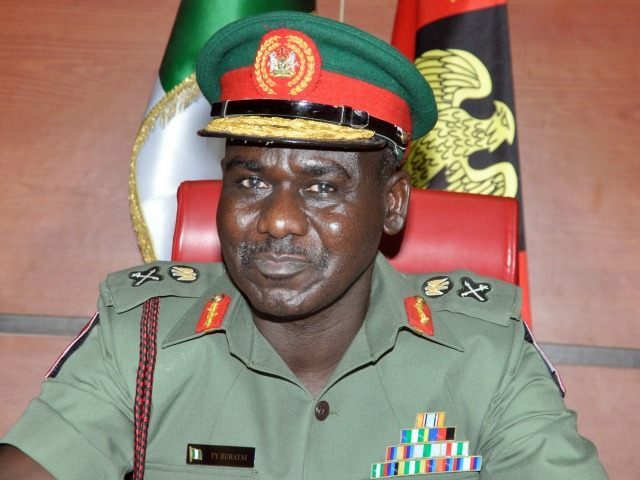The attempted assassination of Nigeria’s Army head has resulted in a major crackdown on a Shiite Islamist group in the nation’s north, and protests from Iran that Nigeria should allow the group to establish a parallel Sharia state on Nigerian soil.
While traveling in Zaria, Kaduna state, members of theIslamic Movement of Nigeria (IMN) attacked the convoy of Chief of Army Staff Tukur Buratai on Saturday. The Nigerian military notes Buratai “was on his way to the palace of the emir of Zazzau to pay homage and also attend the passing out parade of 73 regular recruits at the depot of the Nigerian army in Zaria.” The attack resulted in Nigerian soldiers defending themselves against a large group of IMN members and eventually winding up at the home of IMN leader Sheikh Ibraheem El-Zakzaky.
“A large number of his followers were gunned down around his house on Saturday through Sunday morning where they had congregated to protect the house from military invasion,” according to Bashir Bello, an eyewitness speaking to the Agence France-Presse.
The AFP describes the IMN as a group “which seeks to establish an Islamic state through an Iranian-styled revolution” operating in a majority Sunni country. The IMN’s ties to Iran have resulted in the Islamic Republic condemning the actions of the Nigerian military and summoning the nation’s ambassador. IMN leaders maintain that they are a peaceful group and did not attack Buratai. Spokesmen also insist that 1,000 members of the group were killed in the altercation, and that the Nigerian government is working to cover that number up. In a statement, the group made these statements and accused the government of both hiding the bodies of those killed and committing “genocide” against the group.
Iranian Foreign Minister Javad Zarif has called for “immediate and serious action to prevent violence” against the Islamist group. In a unanimous statement, 214 members of the Iranian legislature accused Nigeria of “setting fire to the residence of a respected cleric while at home with his family and then opening fire on them.” Iranian propaganda outfits have also begun to attack the Nigerian government of a supposed bias against Shiite Muslims. Nigerian President Muhammadu Buhari is a Sunni Muslim. Iranian outlet Tasnim News quoted a spokesman for the IMN as claiming the Nigerian government attacked their group because of “the rapid growth of Shiite population in Nigeria,” adding to the narrative that the quelling of the attack on Buratai was religiously motivated.
Buratai, meanwhile, has personally stood by his military’s response to the attack, telling officials in a press conference that group members “were not only heavily armed but also violently confronted him and his convoy on his way to Zaria.”
“You want to know how I escaped? It was by the will of God that I was able to escape from the place,” Buratai said of his experience with the group. He added that there is video of the incident and “the clip is there” if anyone doubts how violent the mob that attacked him was.
Major General Adeniyi Oyebade, another military official who spoke to the press that day, added that the government has a duty to protect against Islamist parallel governments within Nigeria. “We have nothing against the Shi’ites because they’re all Nigerians and our duty is also to protect them,” he said, “But we cannot tolerate them forming a government within a government.”
Zaria, where the attack occurred, is about 450 miles from Maiduguri, the capital of Borno state and headquarters of Sunni terrorist group Boko Haram. The Nigerian military’s response to a Shiite attack appears to be a smaller operation from the larger counterinsurgency campaign President Buhari launched upon his ascent to the presidency, when he moved the military’s headquarters to Maiduguri and subsequently vowed to eliminate Boko Haram entirely by December 2015. Since then, Boko Haram has pledged allegiance to Islamic State Caliph Abu Bakr al-Baghdadi and become the deadliest wing of ISIS.

COMMENTS
Please let us know if you're having issues with commenting.